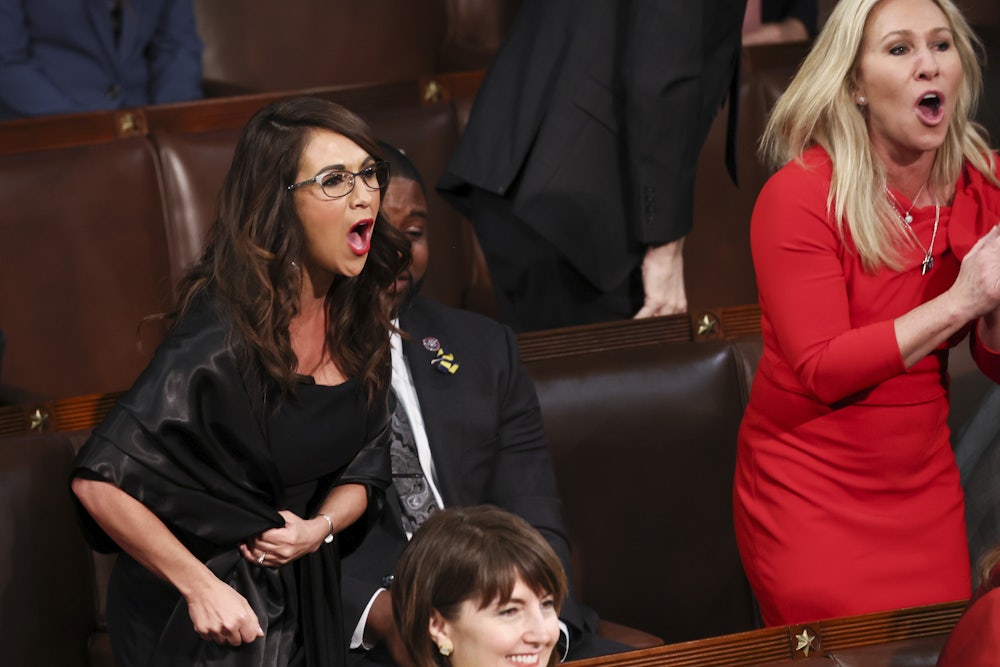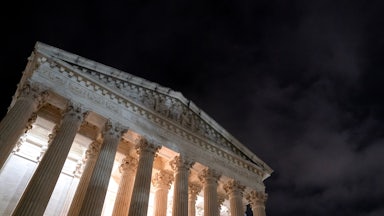Hours after the Department of Justice executed a search warrant at Mar-a-Lago on August 8, Donald Trump posted a stark black-and-white video on his Truth Social account, Trump’s own social media platform. “We are a nation in decline,” the video begins. Rumbles of thunder nearly overwhelm the former president’s litany of decline—“We are a nation that is hostile to liberty and freedom and faith”—before giving way to saccharine strings. The gathering clouds, the apocalyptic tone: It positions Trump as the hero returning to confront the coming storm.
For some it might look like an ordinary Trump ad, a glimpse into a Democrat-made doomsday. But the video is suffused with imagery sending a signal to a deeply devoted section of the president’s fan base: those still adhering to the complex creed of QAnon. They have not only remained followers of the multiple, nested QAnon conspiracy theories since Trump left the Oval Office, but they have managed to further propagate them. A movement we were told would collapse without him has gone mainstream in Republican politics and now boasts the support of more than 20 candidates running for federal or statewide office who will appear on the ballot this November.
As many as 18 QAnon-supporting candidates for Congress will compete in November’s general election, with two QAnon-supporting gubernatorial candidates and two QAnon-supporting candidates for secretary of state, based on analyses from Grid and Media Matters. Including people who lost their primaries, QAnon candidates made the ballot in 26 states in the 2022 elections, and they have raised more than $20 million.
Some of the names of QAnon-adjacent congressional candidates will be familiar, such as Republican incumbent Representatives Marjorie Taylor Greene of Georgia and Lauren Boebert of Colorado, both considered long shots in 2020, whose first week in office included the January 6, 2021, assault on the Capitol by some of their own supporters, and whom January 6 rally organizers allege met with as part of their efforts to keep Trump in office (an allegation Boebert has denied). They are joined by newcomers like Republican Representative Mayra Flores of Texas, who spread conspiracy theories that January 6 was “surely caused by infiltrators” and is currently serving in Congress after winning a special election this past spring. There’s also Ohio Republican congressional candidate J.R. Majewski, who was present at the Capitol on January 6 and boasted of helping get Trump supporters there, and who has a chance at prevailing in a toss-up race. Like Greene and Boebert, Flores and Majewski are on record affirming support for QAnon—“I believe in everything that’s been put out from Q,” Majewski said in 2021—and both have tried to mislead reporters when questioned about their support for QAnon, denying or disavowing their past statements even as they still advance some core QAnon missions, such as casting doubt on the results of the 2020 election.
The dangers in this core belief in a stolen election become even more evident at the state level, where QAnon-supporting candidates may be elected into positions with critical roles in the 2024 election, as part of a strategy led by QAnon influencers beginning in 2021. They have scored two supportive Republican candidates for governor, Doug Mastriano in Pennsylvania and Dan Cox in Maryland, and two for secretary of state, Republicans Jim Marchant in Nevada and Mark Finchem in Arizona. Mastriano and Cox both attended a QAnon conference in April 2022, “Patriots Arise,” at which the opening speaker claimed that “child satanic trafficking” existed and that he would “not stop until these people”—the alleged traffickers—“are dead and in boxes in the ground.” After Mastriano pitched himself to the crowd as the one who God would help win—and said that what he would do to the state of Pennsylvania would make Florida look like “amateur hour”—organizers presented him with a sword to “bless him.”
Back in 2020, when QAnon candidates first came to national prominence, someone like Greene seemed like a long shot, let alone a figure who would move to the forefront of the Republican Party. Not long after she won her election that November, messages from the person or persons who make up the Q of QAnon ceased, and social media platforms began a mass deletion of QAnon accounts and groups. Some predicted that with Trump out of office, the storm was over.
QAnon as an identifier or brand may have faded from prominence, yet as research from the Public Religion Research Institute found, support for QAnon remained mostly stable throughout 2021, and over 2022 has increased. Instead of asking those surveyed if they believed in QAnon, PRRI asked questions about statements they identified as core QAnon beliefs. Eighteen percent of Americans surveyed said they agreed that “the government, media, and financial worlds in the U.S. are controlled by a group of Satan-worshipping pedophiles who run a global child sex trafficking operation”; 27 percent agreed that “there is a storm coming soon that will sweep away the elites in power and restore the rightful leaders”; and 19 percent agreed that “because things have gotten so far off track, true American patriots may have to resort to violence in order to save our country.”
QAnon was not muted by the loss of Trump; instead, it was further fueled by failure. In the days after January 6, after the apparent plot to install Trump as president had collapsed, I spoke with Jo Rae Perkins, an Oregon Republican and QAnon supporter who had lost her U.S. Senate race in November 2020. She was one of 30 Congressional candidates in that year who endorsed or promoted QAnon beliefs. Perkins had been at the Capitol, though she appeared only outside. She claimed to me that she “didn’t see any violence.” She had conspiratorial questions about the death of Ashli Babbitt, a QAnon supporter whom Capitol police shot and killed. She rejected the idea that QAnon believers played a prominent role in the attack on the Capitol. “I’m telling you,” she said, “those were antifa.”
None of this thinking would be a fatal setback for Perkins’s political career; she again won a Republican Senate primary in Oregon, and in November 2022 she will challenge Democratic Senator Ron Wyden. She continues to promote Covid-19 conspiracy theories of a “plandemic,” along with QAnon shows that are now on Rumble after they were booted from YouTube.
There are ample signs that we are in the midst a return to overt QAnon appeals. Since Mar-a-Lago was searched on August 8, Trump has increased his promotion of QAnon accounts on Truth Social. (The platform has become something of a QAnon outpost; Truth Social board member Kash Patel said in June that they were trying to “incorporate” QAnon as part of their effort to “capture audiences.”) The weekend following the search, in a single 24-hour period, he shared 11 claims from at least six different accounts, according to Alex Kaplan at Media Matters, including an account with a flaming Q as its banner image and another with the acronym for the QAnon slogan, “Where we go one, we go all,” as its display name. A few days before that, his Truth Social account also shared a video featuring a song titled “Wwg1wga,” which QAnon supporters interpreted as confirmation that Trump was still very much with them.
QAnon candidates have also prominently failed in 2022, of course. Those seeking to celebrate the loss of QAnon could find that in the unsuccessful congressional bid of Ron Watkins, who is often charged with being Q himself. As the Watkins campaign was clearly fading in late July, The New York Times pronounced, in a nearly optimistic analysis, that candidates who espoused QAnon beliefs in secret child sex-trafficking cabals had little chance at victory. The Times also noted that candidates who pushed the claim that children are being “groomed” (by learning from adults that LGBTQ people, including themselves, exist) were more likely to succeed with voters. They identified Watkins’s fellow Arizona Republican, the gubernatorial candidate Kari Lake, as not being part of QAnon explicitly while “deftly navigating conspiracy theories for political gain.”
What Lake has done is graft QAnon symbolism onto what is too often dismissed as a “culture war” agenda. “Our young people have been tortured,” Lake said on Saturday at an event hosted by Turning Point USA. “They’ve been tortured by their political leaders and they realize that politics matter. They realized that the people who masked their faces, shut their schools down, took all of those firsts away.… They took that away from our young people.” She continued, “Let’s face it, we all woke up during Covid. That was the biggest wake-up call you could ever imagine.” Lake’s words were shared on a popular QAnon forum, via a Telegram post. “This is the power of the Great Awakening,” said the Telegram user, who has more than 200,000 subscribers and runs a Substack newsletter with posts about the “return of Q.” In Lake’s words, these followers detected a QAnon signal, whether intended or not. When she recently appeared on the QAnon-influencer-co-hosted MatrixxxGrooove Show to urge viewers to vote for her, it only reinforced the message, with co-host “intheMatrixxx” noting that Lake’s presence showed him and “the anons out in this community” what influence they have.
It’s true that Lake is not offering unequivocal support to QAnon, even as she accuses Democrats of supporting “grooming” and not “child satanic trafficking.” But make no mistake: When Lake repeatedly scapegoats LGBTQ people with groomer rhetoric, that is not somehow a less extreme position. And when Lake deems civil rights protections for LGBTQ students a “perverted sexual agenda” by Democrats, it is no less a dangerous departure from reality than when QAnon supporters do so.






